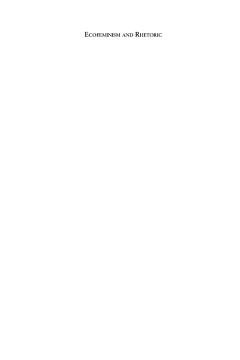
Additional Information
Book Details
Abstract
By drawing on the complex interplay of ecology and feminism, ecofeminists identify links between the domination of nature and the oppression of women. This volume introduces a variety of innovative approaches for advancing ecofeminist activism, demonstrating how words exert power in the world. Contributors explore the interconnections between the dualisms of nature/culture and masculine/feminine, providing new insights into sex and technology through such wide-ranging topics as canine reproduction, orangutan motherhood and energy conservation. Ecofeminist rhetorics of care address environmental problems through cooperation and partnership, rather than hierarchical subordination, encouraging forms of communication that value mutual understanding over persuasion and control. By critically examining ways that theory can help deconstruct domineering practices—exposing the underlying ideologies—a new generation of ecofeminist scholarship illuminates the transformative capacity of language to foster emancipation and liberation.
Douglas A. Vakoch is Professor in the Department of Clinical Psychology at the California Institute of Integral Studies, as well as Director of Interstellar Message Composition at the SETI Institute. He serves as Chair of both the International Academy of Astronautics (IAA) Study Group on Interstellar Message Construction and the IAA Study Group on Active SETI: Scientific, Technical, Societal, and Legal Dimensions. His books include Communication with Extraterrestrial Intelligence (CETI) and Psychology of Space Exploration: Contemporary Research in Historical Perspective.
“ …research students and academics will enjoy reading [this volume], and undergraduate students may benefit from the overview chapters that frame the theoretical approaches therein. I commend the collection on its ambitious scope and look forward to further investigations that extend critiques of gender, power and technology in such an engaging, interdisciplinary way. While feminist revitalisations are changing the political, social and cultural context in which this text sits, its validity as a piece of academic work remains.” · Gender, Place and Culture
“Ecofeminism and Rhetoricis helpful as an introductory text on ecofeminism for undergraduates, as well as for researchers open to incorporating an ecofeminist outlook into their work. [It]also is a valuable resource for those already familiar with ecofeminism…[The volume offers] valuable contributions to the academic literature while also opening pathways for activists and individuals concerned with creating change in their communities.” · Anthropological Forum: A Journal of Social Anthropology and Comparative Sociology
“[This volume’s] material is challenging—in terms of its challenge to popular thinking and conventional scholarship—and, yes, even troubling. However, the authors' reflection on their own work and the frames offered at the beginning and the end of the book provide useful ways of processing the theories and examples, making this is a book… appropriate for a variety of audiences ranging from the seasoned ecofeminist to one who has just discover ecofeminism.” · Women & Language
“Vakoch’s essay collection, although varied in subject matter, is successful because of its loose definition of both rhetoric and ecofeminism…[It] presents unique and intelligent arguments that uncover new avenues to approaching different ecologies…Plagued by accusations of containing impractical, high theoretical subject matter, ecocritical theory needs more tangibly applicable strategies like those found within Ecofeminism and Rhetoric to enact environmental change.” · The Journal of Ecocriticism
“A book on ecofeminist rhetoric assumes a difficult task….this collection of essays does an admirable job of opening the topic of ecofeminist rhetoric to further inquiry…and gives us a small but potentially very valuable window on one avenue of developing the field in this postapocalyptic era of global warming, species reduction, desertification, ecoracism, environmental injustice, slumming as a growth industry in rapid urbanization, and one energy crisis after another.” · Rhetoric Review
"In less that 180 pages, this book provides a comprehensive, well written, and carefully annotated overview of ecofeminism including the past, the present, and anticipated further developments in the future. Highly recommended!” · Mother Pelican. A Journal of Sustainable Human Development
“[O]ne of the very few books to have been published in the last 10 years on the declared topic of ecofeminism…the volume is a necessary and timely rethinking of ecofeminism; it includes some strikingly original essays that challenge and extend current ecofeminist thinking in exciting ways; and its general insistence on action and intervention (including rhetoric) as a way of collecting and evaluating ecofeminist thought is intelligent, effective and important.” · Catriona Mortimer-Sandilands, York University
“The overall approach of an ecofeminist analysis focused on rhetoric (discourse and persuasion) is original and interesting in its promise of a new and valuable form of, or perspective on, ecofeminist analysis. Many of the chapters struck me as flat-out fascinating: both wonderfully written and truly ground-breaking in their originality of focus and integration. In fact, what I think is most wonderful about this book is its real, almost startling, originality.” · Catherine Roach, University of Alabama
